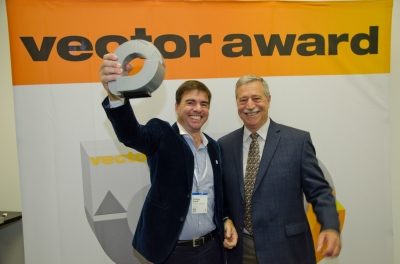Washington Company Wins Vector Award from Igus

Cordoba Technologies of Washington state won a vector award from Igus for the development of a new robotic toolbar that serves the center pivot irrigated agricultural industry. The award was presented at Hannover Messe 2018.
Igus GmbH, the Germany-based manufacturer of engineered plastics, distributes vector awards every other year. Igus USA is based in Providence, R.I. Cordoba Technologies, based in Walla Walla, Wash. won the silver vector award in a competition that included 187 applications from 30 countries. The vector awards recognize the world’s most innovative energy chain applications.
Cordoba’s product, Hummingbird, is designed to reduce chemical use while increasing farm productivity. In the application, cables and hoses are carried in a micro flizz system from Igus. The energy chain enables exceptional flexibility and a high degree of precision, allowing placement of sensors or spray nozzles over a crop, which supports sustainable agriculture practices.
The Hummingbird toolbar is a multi-tasking tool that allows precision placement of crop protection products in open fields. The product replaces expensive tractor-based machines by utilizing an existing asset already in the field. It can be equipped with sensors and software that collects data relating to crop health, nutrient levels, and detect diseases. Given the on-demand availability of the system, and ultra-high precision, only the minimum levels of crop protection products are applied on a case-by-case basis. It takes precision agriculture to a completely new level.
The micro flizz system from Igus carries cables and hoses while an energy chain travels in an enclosed aluminum rail. Cordoba Technologies, Inc. earned the award for its creative energy supply solution, and its positive impact on the environment.
Spanish company wins gold vector award
A company from Spain, Loxin, won the gold vector award for its industrial robot that is used in the final assembly of aircraft fuselages. In the system, two e-chains from Igus move 3-dimensionally, so that the robots do not collide with the fuselage and cause damage to the aircraft.
The e-chains are attached parallel to each side of the robot arms, which facilitates movement of the arms and makes the fuselages more accessible despite the difficult geometries involved.
In addition, different cables and hoses for connecting elements can be guided to the end areas of the robot. Additional energy chain systems with different geometries and directions of movement power the robots.
Loxin earned 5,000 euros for its robot. Winners selected from a jury that includes representatives from specialist journals, industry and research.
Application for elevators takes bronze
Thyssenkrupp Elevator captured the bronze vector award with the development of an unusual energy supply system. The elevator company, one of the leaders in lift technologies and services, replaced ropes with linear motors. The linear drive and guide rod can rotate 90 degrees, which allows the cabins to move vertically and horizontally.
Engineers were challenged by the amount of cable required for depth and rotational movement. Cables also were subject to demanding standards, including shielding, small diameters and bend radii.
The energy chains are used for the first time in the lift sector and include two counter-running energy chains running on a circular path and guided in a trough system. With the appropriate Igus cables, the system delivers the necessary energy and data transmission to the rotating platform.
Swedish company also earns recognition
CorPower Ocean of Sweden won a special vector award for its energy generation system based on ocean wave energy. CorPower’s innovative and environmentally sensitive solution delivers substantially more energy density than wind power and solar cells, and its creative product will withstand rough conditions inside ocean buoys for many years.





